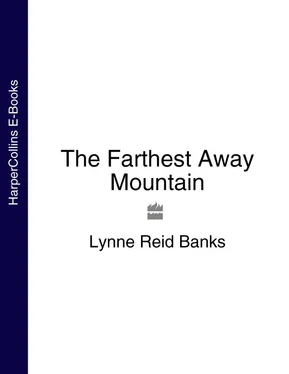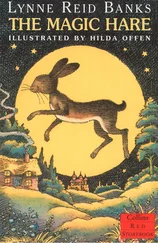Then she would turn and look the other way, towards the mountain. She would stand quite still, as if listening; then she would sigh very deeply before moving on again.
One morning, very early, Dakin woke up sharply to find herself sitting up in bed.
“Somebody called me!” she thought. “I heard a voice in my sleep!”
She jumped up and ran to the open window in her long nightgown. Outside the sun was just appearing beyond the farthest-away mountain, breathing orange fire onto the strange, patchwork snow and streaking the pale sky with morning cloud-colours. It was still cold, and Dakin shivered as she called softly into the empty world:
“Did somebody want me?”
No one answered, and Dakin thought she must have dreamt it. But just as she was turning to jump back into bed again, she saw something which nearly made her fall out of the window.
The mountain nodded.
At least, that’s what it looked like. As the sun almost burst over the top, the black head of the mountain seemed to dip, as if to say, “Yes, somebody wants you.”
Dakin stared and stared, forgetting the cold, until the sun was completely clear of the peak and stood out by itself, round and red and dazzling. Nothing else happened, but all the same, Dakin knew. It was time to start.
Moving quickly and quietly, she put on her warmest dress with three red petticoats under it, her stout climbing boots which laced with coloured lacings up past her ankles, and the white apron she always wore. She hadn’t time to plait her hair so she pushed it out of the way under her long white stocking-cap. Then she tiptoed downstairs.
It was difficult to be quiet because of the boots, which she should have left till later. Her mother called from the bedroom:
“Dakin, is that you?”
“Yes, Mother,” said Dakin, wondering how she would explain her going-out clothes if her mother saw her.
“Put on the water for the porridge, little one,” called her mother sleepily.
Dakin almost changed her mind about going in that moment. She wanted to run into her parents’ room and curl up under the big feather quilt, hugging her mother’s feet as she used to when she was little. It would be so safe and happy to put the water on the big black stove for the porridge, and later to eat it with coffee and wheaty bread with Mother and Father and Triska, and feed the hens and do the washing and go on all day as if the farthest-away mountain had never called her.
For a moment she paused on the stairs. Then she thought, “No. I must do what I’ve said I’ll do.”
So she went downstairs, and pumped the water very quickly and put it on to heat. Then she hastily filled her knapsack with the things she thought she’d need – a chunk of bread and another of cheese, a slab of her mother’s toffee, a mug and a knife, a candle and some matches. Then she looked round. On the window-ledge was a book of poems her father had brought back for her from the city, and she put that in.
Then, as an afterthought, she lifted off the mantlepiece the little brass figure of a troll that her father had found years and years ago on the very edge of the pine wood. She held the little man in her hand and looked at his impish, bearded face under the pointed hat.
“I shouldn’t take you really,” she whispered. “You’re brass, and you’re heavy.”
But nonetheless she slipped him into her knapsack and felt him slide between the loaf and the book and lie at the bottom. And she didn’t feel so lonely, suddenly.
Now she could definitely hear sounds of movement from above, and she knew that soon they’d be down. So she pulled her warm brown cloak down from the hook behind the door and wrapped it round her; then she put all her weight on the heavy latch, and the next moment she was out in the bright morning, running, running towards the farthest-away mountain with her white stocking-cap flying out behind her and her knapsack bumping.
First she had to go through the village, or rather across a corner of it. People she knew were just opening up their shutters and putting their bolsters and sheets on the upstairs window-ledges to air.
“Good morning, Dakin!” they cried as she passed. “Where are you off to in such a hurry?”
“I’m going to the farthest-away mountain,” she called back over her shoulder. But they all thought she was joking, and laughed, and let her go.
CHAPTER TWO The Wicked Wood
Soon she had left the village behind. She climbed a little green hill and ran down the other side, and when she looked back she couldn’t see any of the village except the tip of the church steeple. She crossed a rushing, mint-green river by jumping from rock to rock, and then she was as far away from home as she’d ever been. The children of the town were never allowed to go beyond the river alone, because beyond the river was the wood, and the wood could be dangerous, even in daytime. Under the thick pine branches it was always like dusk, and every direction looked the same, so that it wasn’t just easy to get lost, it was almost impossible not to.
Dakin paused on the dark edge of the wood, and looked back over the sunny-smooth meadows with their knuckles of rock and the gay foaming river dashing on its way to the sea. She looked ahead, but being under the first branches she couldn’t see the farthest-away mountain any more, only the murky depths of the forest, its tree trunks filling in the spaces between each other until there seemed to be a solid wall of them.
“How will I know that I’m going straight towards the farthest-away mountain, and not walking in circles like Meggers Hawmak when he went in after his cow and was lost for three days?” she wondered.
“Better go back,” whispered a little voice inside her head, “before it’s too late.”
Dakin took a step back towards the rushing river, and then stopped.
“No,” she said aloud and started off under the trees.
Before she’d been walking for three minutes everything round her grew dim and every direction looked the same. She turned to look back the way she had come but it was just as closed-in behind as ahead, with only little trickles of sunshine penetrating the thick pine needles. When she turned to go on she found she didn’t know whether she’d turned in a half-circle or a whole circle, whether she was going back towards the village or on towards the mountain, or in another direction altogether. There were no friendly sounds of birds or scurrying of little animals, no sounds when she walked on the spongy needles and moss, no hum of insects or whisper of breeze – in fact, no sounds anywhere at all.
“I’m frightened!” realized Dakin. It was for the first time in all her life and it was a horrible feeling.
She had never felt so completely alone. She felt tears pricking her eyes like pine needles. And then she remembered.
She wasn’t quite alone, after all. She had the little troll.
Quickly she slipped undone the straps of her knapsack, opened it, and reached to the bottom between the rough loaf and the smooth book. Her fingers touched the small, heavy figure, and closed round it. It fitted her hand in a comforting way. She drew the little man out and looked at him. He reminded her of home and the warm kitchen. A tear fell off her cheek and splashed on his long brass goblin’s nose.
He sneezed.
Dakin shrieked and dropped him in the moss. She backed against a tree, her eyes huge and her hands to her face.

The little troll picked himself up. He stood knee deep in moss with his hands on his hips, looking up at her. For a long moment they stared at each other. Then the little man, in a voice like the far-away cracking of twigs, said:
Читать дальше













